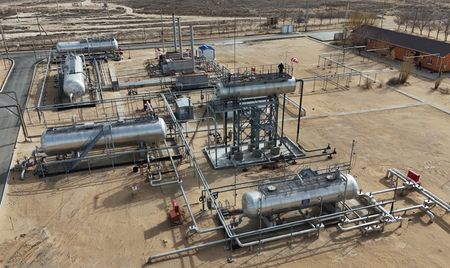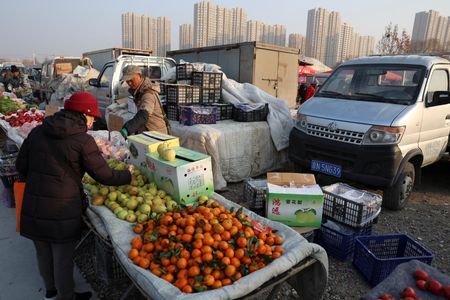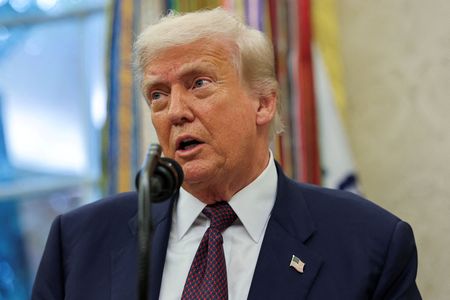By Tamara Vaal
ASTANA (Reuters) -Kazakhstan will prioritise national interests over those of the OPEC+ group when deciding on oil production levels, the country’s newly appointed energy minister told Reuters, ratcheting up the standoff with the group.
Kazakhstan has repeatedly exceeded its oil output quotas over the past year, angering some OPEC+ members, including top producer Saudi Arabia, which pushed for speedier hikes of OPEC+ production at the last meeting, OPEC+ sources have said.
Kazakhstan pumps about 2% of global output and relies for most of its production on global majors, such as U.S. Chevron <CVX.N> and Exxon Mobil, which have invested hundreds of billions of dollars in the country since the collapse of the Soviet Union.
OPEC has a history of similar clashes with countries such as Nigeria and Angola, where production exceeded targets and governments did little to curtail it despite often having built into their contracts the right to regulate output.
As a result of such tensions Angola left OPEC+ in 2023. Qatar left OPEC in 2018 citing rising gas production and domestic considerations.
“We will try to adjust our actions. If our partners … are not satisfied with the adjustment of our actions, then again we will act in accordance with national interests with all the ensuing consequences,” energy minister Erlan Akkenzhenov, who was appointed last month, told Reuters in an interview.
“This is a broad formulation, but it completely covers the entire situation that we have now. Act only in accordance with national interests,” he said.
Kazakhstan is unable to reduce production at its three large oil projects because they are controlled by foreign majors, especially at the Tengiz field, led by Chevron, Akkenzhenov said.
The energy ministry also issued a statement, quoting the minister as saying that Kazakhstan was a responsible participant in the international energy community and it was interested in predictability and the demand and supply balance.
“Our participation in OPEC+ is an important tool for ensuring global stability, creating conditions for the implementation of national plans and attracting investment. We are committed to constructive work within the framework of the agreement and fulfilling our obligations,” the statement quoted Akkenzhenov as saying.
Kazakhstan reported a 3% decrease in oil output in the first two weeks of April from the March average but it still exceeded the OPEC+ quota.
Kashagan and Karachaganak, Kazakhstan’s two other large upstream projects, are also operated by Western oil majors.
The government would hold talks with majors but did not hold much sway over them, Akkenzhenov told Reuters: “We can’t. We don’t control these processes there. Because our international colleagues make the decisions”.
The three projects account for 70% of Kazakhstan’s output. Other fields are more mature and Kazakhstan risked losing them entirely if it started reducing output there.
“If we start to shut down old deposits, it will be a shot in the foot.”
The Central Asian state has pledged to compensate for overproduction by reducing oil output through to June 2026.
Kashagan project is operated by a consortium which includes Eni, Shell and Kazakhstan’s KazMunayGaz.
Karachaganak is controlled by a group which also includes Eni, Shell and KazMunayGaz.
Kazakhstan will export 1.2 million barrels per day this year via the CPC pipeline via Russia, Akkenzhenov said.
The pipeline, operated by a consortium that includes Chevron and Exxon, accounts for 80% of Kazakhstan’s oil exports.
It will undergo maintenance in the second half of May but stockpiles at the Russian port of Novorossiisk will ensure steady loadings, Akkenzhenov said.
Kazakhstan can also boost oil exports via Russia’s Druzhba pipeline to Germany to over 2.5 million tons a year, though it would depend on Moscow’s agreement, he said.
(Reporting by Tamara Vaal; additional reporting by Mariya Gordeyeva; writing by Vladimir Soldatkin and Louise HeavensEditing by Tomasz Janowski, Alexandra Hudson and Nick Zieminski)










